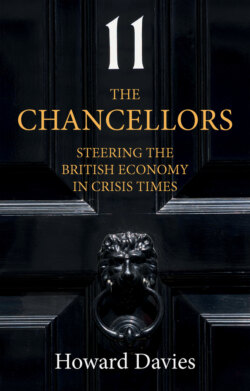Читать книгу The Chancellors - Howard Davies - Страница 7
1 Economic Performance
ОглавлениеGus O’Donnell, Permanent Secretary to the Treasury from 2002 to 2005, has declared that ‘the era of GDP being the unique measure is now over’. He quotes Robert F. Kennedy, who said: ‘GDP measures neither our wit nor our courage, neither our wisdom nor our learning, neither our compassion nor our devotion to our country, it measures everything, in short, except that which makes life worthwhile.’1 And he points out more prosaically that gross domestic product (GDP) as conventionally defined is not well suited for modern service-based economies with larger government sectors. That describes the UK quite well, indeed increasingly so. But even O’Donnell acknowledges that GDP measures ‘have a long history and are very useful for making comparisons over time and between countries’.
Using that imperfect methodology, how well did the British economy perform under the five Chancellors whose periods of stewardship we are considering, both in absolute and relative terms? And what can we confidently say about the influence of the government’s economic policy on that performance?
The period, like Gaul, divides into three parts. The Labour government was in office from 1997 to 2010, which is a long enough interval to use for comparisons forward and back. The figures are distorted somewhat by including the years of the financial crisis and its immediate aftermath, but if we allow Labour the pre-crisis boom, it is not unreasonable that they should also accept the bust. Brown famously declared that he had put an end to boom and bust, so it would be hard for him to complain. The second period runs from 2010 to 2016. That encompasses the full term of the Coalition government, and the first year of a majority Conservative administration. Osborne was Chancellor throughout. The third period begins with the EU referendum, which marked the beginning of a significant change of trend. The end of that third period is dominated, and distorted, by the Covid crisis, but the four-year stretch from the launch of the referendum campaign to the first Covid lockdown is long enough to have its own distinct characteristics.
